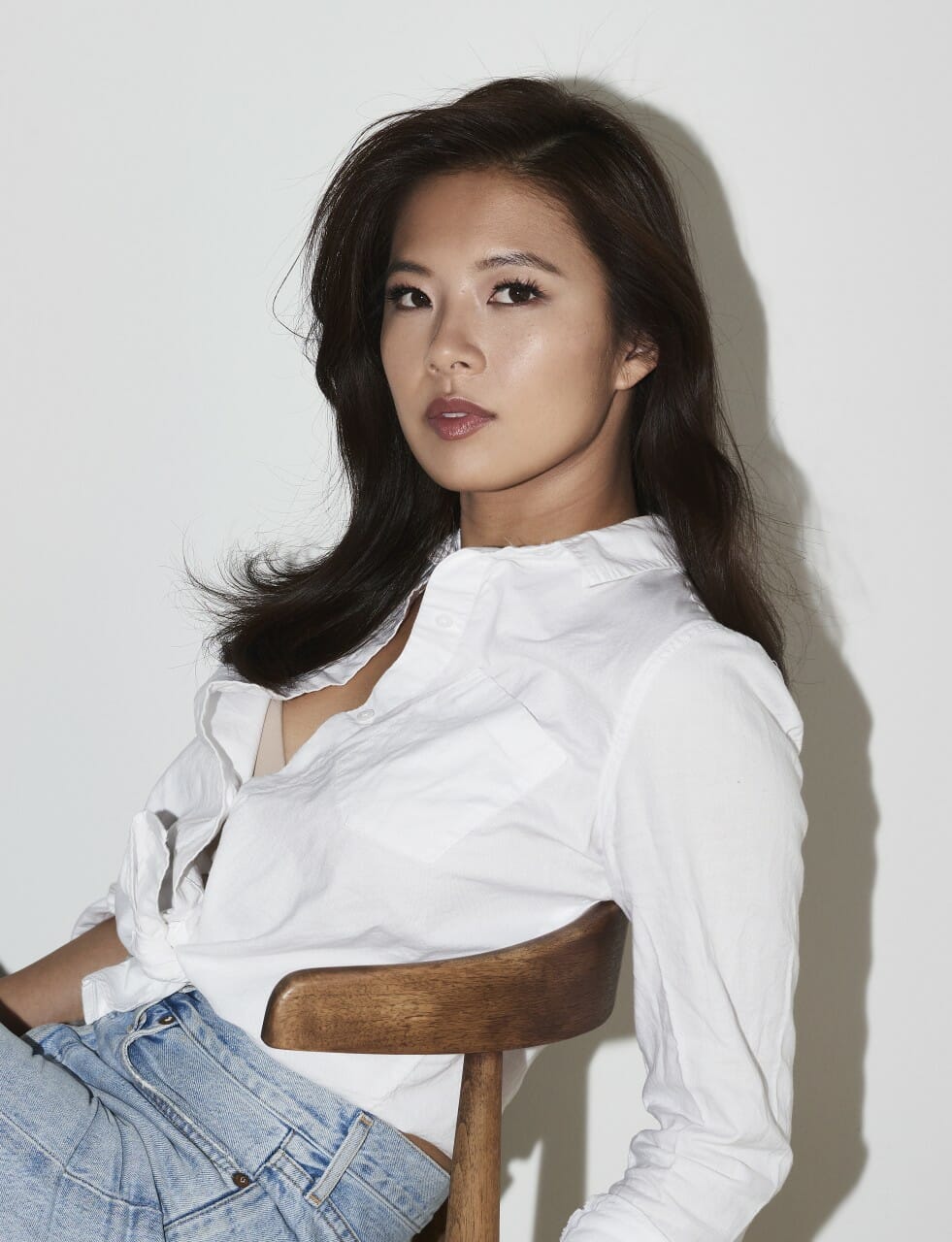
Dave, Tigertail, and Multi-Cam Sitcoms w/ Christine Ko December 8, 2020
Despite being sheltered at home, Christine Ko’s 2020 has remained considerably eventful. She played Emma on the hit FX comedy series Dave, as well as Angela in the new groundbreaking Netflix movie Tigertail. These two projects have very little in common thematically, but they do show Ko’s incredible range and ability to tell stories that move us. We had a great time speaking with Ko on her recent premieres, journey as an actress, and fight for representation in an entertainment that still has so much room to grow.
BLNCD: First off, how is your shelter-in-place going?
CK: It’s going as good as it can be. I’m healthy and safe and that’s all you can really ask for at this time. It’s definitely a big change and can get difficult at times. Anytime you get sad, all you have to do is turn on the news and you’ll instantly realize that your situation isn’t as bad as it could be. I’ve always loved cooking so this has allowed me to really spend time and work on the recipes I’ve never been able to try. Also just started learning guitar, so far, I suck.
BLNCD: It’s cool to see the intense dichotomy between your comedy work on FX’s Dave and your dramatic work in Netflix’s Tigertail. Have you always worked in such a great range or does one genre feel more comfortable to you than the other?
CK: It’s funny, because I always thought I was a dramatic actor and then the first job I ever got was on a multi-cam sitcom. It really made me think that maybe I should try more things and really expand what I like to do. I honestly think my personal journey has been trying things through failures and then learning from them. When that first job, which was a pilot, didn’t get picked up, I decided to spend more time honing my comedy skills and working in an unfamiliar space. The one thing I loved about the dramatic work in Tigertail was that Alan, the director, really wanted subtle performances and that has always been difficult to achieve. How does one bring all that emotion and tension in a scene with no words and barely any movement? I feel like I learned a lot after being on that set. Dave was a great intro to improving on the day. I love that we have our scripts and then we have full access to improvise.
BLNCD: Tigertail is a tremendous victory for both immigrant narratives and Asian-American representation in the media. What was it like making that movie? What can we all do to encourage the industry to green-light more diverse productions?
CK: Making Tigertail was both cathartic and a celebration at the same time. It was my first time on set with fellow Asian-American actors and creatives and that in itself was a celebration. It felt so nice to be able to talk about these scenes and have people truly understand the personal connection to them through our culture. It was really enjoyable to not have it be a “teaching moment” on set and more of an arena to just play. I felt like it was cathartic, because I’ve dreamed of working on a project like this and hope that when little girls see it, they realize that they can be the lead of a film too. The main way to get more projects green-lit is to support them. Watch them. Tell your friends. Tell your family. The only tool people have is viewing content and when studios see that their film/tv shows have viewership, that makes them think it’s successful and makes them want to make more.

BLNCD: You were hilarious as a principal on The Great Indoors (CBS), which was a multicam comedy filmed in front of a live studio audience. What are the unique joys and challenges of acting on a multicam series?
CK: The best part is the live audience. You know instantly if a joke does well, because you hear laughs, or it falls flat and it’s silent. What’s great about that is then the writers get together in a huddle and write new jokes on the spot. So you never really know what you’re going to say and that keeps it really fun and interesting. Also so nice to feel like you’re doing a play every week and knowing that everything is in sequential order. Each episode is one after the other so it’s different from single cam when sometimes you shoot a scene from episode 10 and then jump back to episode 4 later in the day and then back to episode 6. It helps you really keep track of the characters.
BLNCD: When did you first discover acting was you calling? Are you the first of your family to work in this industry?
CK: I don’t think I knew that I wanted to be an actor when I was young. The interesting thing is that my birth mom was an actor and my birth dad was a singer in Taiwan, but I was separated from them when I was 3 and raised in Georgia. I wasn’t exposed to the industry, but I knew I loved telling stories and once I tried a bunch of different career paths, I realized acting was my calling.
BLNCD: Most working creatives have some sort of epiphany moment in the first few years of their career that says “Yep, this is exactly what I’m supposed to be doing.” Did you have a moment like that?
CK: It was a rough journey for me, like it is for many who decide to become actors and move to LA. For 4 years, I felt like I wasn’t really getting anywhere and all I was doing was working weird part time jobs. Sometimes I would get a commercial gig here or there and I realized that nothing made me happier than being on set and creating with other people. It didn’t matter how difficult life was, from not being able to pay rent, to constantly missing out on weddings, trips, family time, you name it. It was all worth it to me and so I knew this was what I had to do.
BLNCD: We love following you on instagram, because you speak very candidly about the rollercoaster of challenges and disappointments that come with being a working actress. What would be your advice to younger creatives who are wondering if they have the resilience to do this industry?
CK: You’re going to hear from everyone that it’s hard. I think that’s a very true, but also a general statement. I don’t think I truly understood what “hard” meant. What it means is that most likely you aren’t going to be working for a very long time. So you’ll have to find a means to support yourself financially and even when you are working, it isn’t consistent so you might have to keep that side job for quite some time. It’s ok to be a waiter and an actor. It’s ok to be a babysitter/dog walker/etc. Take that time and realize you are the CEO of your company when you’re an actor. It’s a one person company and the time you invest in yourself and your acting is what makes the company grow and flourish. If you work at least 40 hours a week on your craft, whether it’s classes, watching films, writing, creating projects with other actors, that’s all investing in yourself and I promise you there will be success in your work. I’ve never met someone who worked every day in their life and got absolutely nowhere. It may not be the path you envisioned, but nothing makes up for the work.
BLNCD: Having appeared on film and television professionally for over eight years now, how has the way you approach your craft changed the most?
CK: The one constant that has stayed the same is the work that goes into every project. The amount of preparation and research is something that personally works for me. I’m not very good at winging things and I’ve learned that throughout the years. The one thing that has slightly changed and I’m still working on it, but I’m less affected by people’s opinions. It’s hard, because what we do is so personal, but you realize that once you do the work and you put in the time, that’s all there is for you to do as an actor and you have to let it go. You have to move on to the next one and if it’s not yours, it’s not yours. But it’s ok to fight for it and feel all the feelings and then you have to let it go.
BLNCD: What are you looking forward to? What’s on the horizon, Christine?
CK: I’m mostly looking forward to life going back to what it was like before all this. It’s been scary to think about how much our industry has changed and really not sure when any of us will go back to work. I just hope we all come out of this nicer and kinder and more appreciative of what we have. I have another film on the horizon that’s a completely different genre than both Tigertail and Dave. Excited to be able to talk about it more when we come back.
Story by John Mark